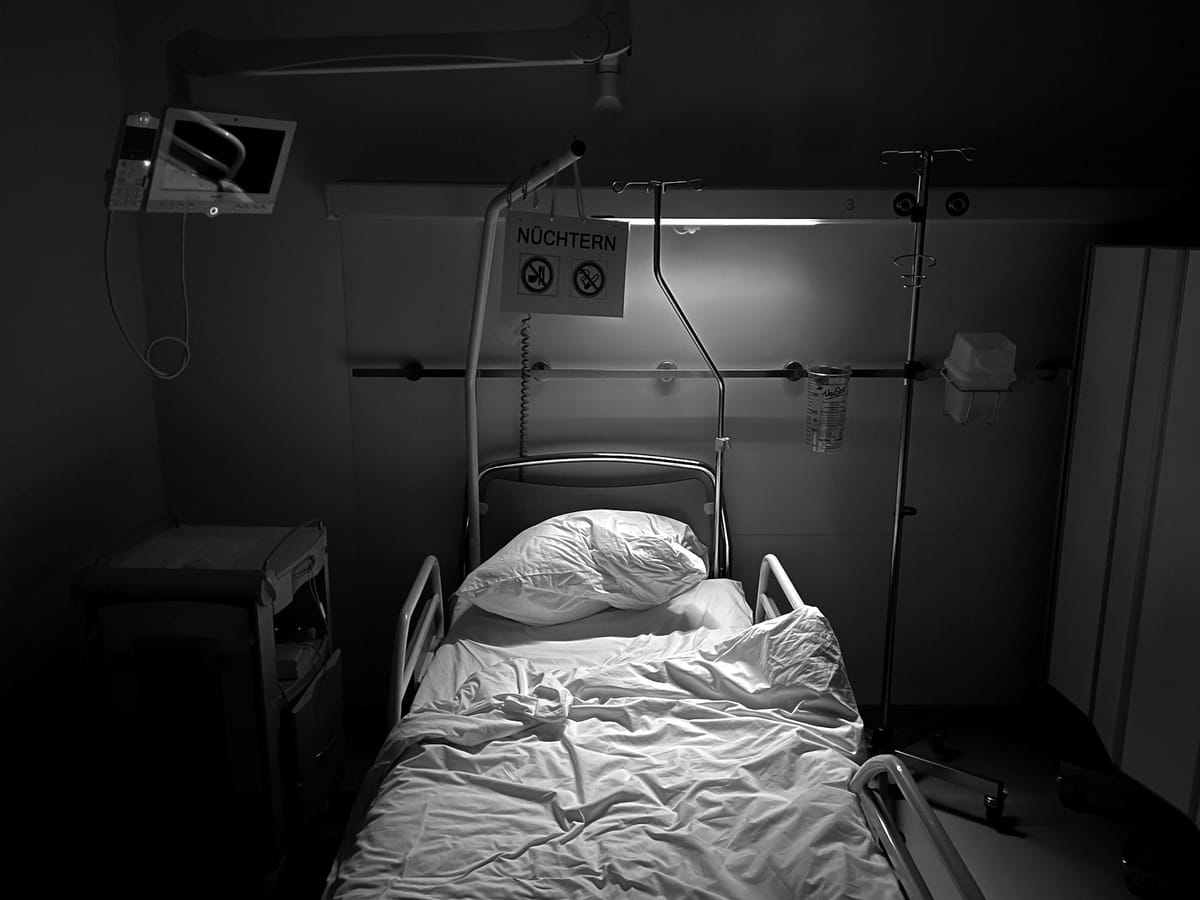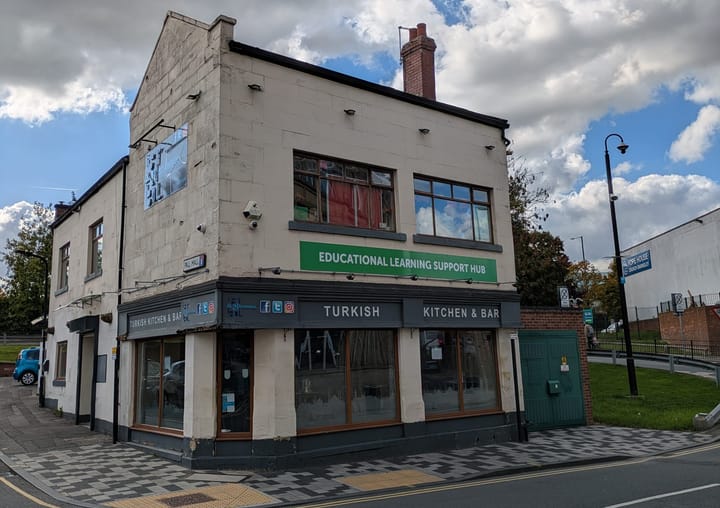To imagine a world that is organised beyond the constraints of capitalism, we must start from where we find ourselves. The Angry Workers collective recently launched Vital Signs, a magazine that attempts to contribute to the revolutionary organisation of the health care sector.
By the Angry Workers collective
This article is republished from the Angry Workers' website and is accompanied by an introduction that they wrote for Interregnum. Our aim in republishing this initiative is to help spread the word and, in particular, connect it with other health care workers that are not aware of it yet. You can contribute by sharing Vital Signs, particularly with friends and family in the industry, donating to support publication costs, and contacting the Angry Workers in order to circulate Vital Signs in your workplace or through organising public events.
The article below is a political introduction to why we started Vital Signs, a magazine for fellow workers in the two main hospitals in Bristol.
The background of the project is a collective effort to re-politicise the world of work. This means that, beyond just fighting for better conditions, we want to ask why work is organised the way it is, and who has the power to make those decisions. We believe that this basic question of workers' control is the first step to ask wider questions: why is society organised the way it is, and who has the power to decide about this?
We take the collective experiences of workers as the starting-point. We focus on the fact that workers manage to cooperate and keep society running through their combined labour, despite the plethora of hurdles that this system puts in their way: the self-interest of individual departments and corporations, the precarious and militarised global supply-chains, the irrational hierarchy and bureaucracy, the unpredictable movements of markets, and the arbitrary and abstract goal of turning our labour into money. This experience of cooperation against all odds is the basis which allows us to imagine an alternative society and the struggle for it.
We start from where we find ourselves, in a small corner of the essential health industry, but we reach out to other workers and initiatives who fight for working class autonomy wherever they are.

Vital Signs is a new print magazine circulated within the two main hospitals in Bristol, addressing 18,000 fellow workers. With the magazine we want to support the independent organisation of our daily struggle for better conditions and support the development of day-to-day workers’ control. We want to contribute to a critical analysis of the health sector and of the hurdles that corporations and the state create for the development and socialisation of medical technology and knowledge. The magazine also encourages us and our fellow workers to reconsider the relationship between health workers and working-class patients on a human and psychological-spiritual level.
We aim to focus on the rediscovery of the inner connection between day-to-day struggles, analyses of the functioning of the wider health sector in society, and a critique of how work is organised. We see this as a precondition for the emergence of a pragmatic revolutionary perspective of transition towards a new society. Here, health workers do not just present the ‘caring element’ within a wider working class program. On the contrary, the modern hospital and medical-industrial sector are extremely advanced in terms of global cooperation, complex labour, applied science, and technology. Therefore, the 1.4 million workers employed within the complex network of the British National Health Service will have a lot to contribute when it comes to the question of how to re-organise social production and society at large from below.
As a magazine, Vital Signs will try to relate these debates within the health sector to wider programmatic political positions that we propose as communists, e.g. against any state in any capitalist war, against parliamentarian illusions, and for the formation of independent political organisations of the working class. We aim to create a pole of attraction across the two workplaces oriented towards a revolutionary critique not just of the health sector, but of society more broadly. We hope that over time and with the help of discussion events a group of workers will congregate around Vital Signs and develop a collective practice within and beyond the hospital boundaries. We also hope that we can link up with like-minded independent initiatives in other sectors of the essential industries, as we believe that any revolutionary strategy and working class autonomous organisation has to be developed from a social and productive mass base.
If you are interested in working together and/or organise a meeting with us in your town, please get in touch. As Vital Signs is an independent initiative, we also depend on practical and financial support from fellow workers and militants.
Email: vitalsignsmag@proton.me
Online version of the magazine: www.vitalsignsmag.org
Twitter: @healthworkersU1
Facebook: https://www.facebook.com/share/5hifwphaFh6EM69X/
Instagram: @vitalsignsmag
It is clear that in the current moment of global crisis, intensifying military conflicts, and climate catastrophe, the attitude of many well-meaning leftists towards the working class is fatal. Too often the working class is reduced to victimhood, as sufferers of inflation, corporate greed and repression. As revolutionaries within the essential industries we want to turn the tables and emphasise the social power and responsibility that the working class has. Only out of the mass social relations and the eco-technological knowledge of the class can we develop a strategy of rupture with – and material conversion of – the current way that we produce our lives. These are not too far-fetched aspirations. A minority of militants of our class, for example the factory collective of the occupied GKN plant in Florence, have made important steps towards the elaboration of such a strategy.
The global pandemic clearly demonstrated the inability of the current system to deal with the crisis, and therefore, the social responsibility of the working class. The current powers could not handle the pandemic in the best interest of all, due to diverging corporate and national interests and the inability to create effective coordination across a segmented medical sector, shredded into hundreds of separate and underfunded labs, hospital wards, and community clinics.
It would have been the task of medical workers internationally to overcome the internal divisions imposed by the current system, to develop an alternative strategy and to impose it against corporate and state interests. This cannot be done on a planning board or through Zoom meetings. Individually, workers do not have the time or necessary knowledge to develop an alternative plan; for example, of how to handle the pandemic. Both time and knowledge must be re-appropriated and socialised collectively as part of a class movement that overcomes the internal divisions between intellectual-scientific, complex-medical, and manual-care labour. Again, this is not a far-fetched hope, as we can see in the development of an international cycle of struggles in the health sector during recent years, triggered by the last straw of the pandemic. Some of these struggles brought workers of different departments and hospitals together. The problem is that due to the limitations imposed by labour law and separate trade union interests these struggles neither developed a sufficient level of self-activity nor did they manage to question professional divisions as such. Here, we can see the close inner-relation between the way we organise our struggles and our capacity to develop a political vision of a social alternative. Still, the international cycle of struggles provides us with the chance for a mutual learning process.
The limitations of current workers’ struggles are also reflected in the political debate. Most of the discussions around revolutionary strategy within the wider revolutionary milieu remain on a level of separation and disintegration. The most prevalent separation is reproduced when we detach a ‘rank-and-file’-strategy, that still largely focuses on trade union organisation from the political sphere of party politics. Here the sphere of production is reduced to ‘economic issues’, while ‘politics’ are often limited to the debate of global moments or general party programs. With Vital Signs we want to encourage the re-politicisation of the sphere of work. Why is work organised the way it is, and who, or which structural forces, determine this? How are divisions between workers reproduced at work and outside of work? What are the systemic forces that shape the development of knowledge and technology? How is our struggle for the defense of our conditions linked to the question of how we can transform the ways that we produce our lives?
We see Vital Signs Magazine as part of a refoundation of working class strategy and organisation. The process of rebuilding a revolutionary organisation has to envision stages of development. There will be waves of riots and insurrections in the days to come, no question. These will be schools for our class, but without the socialisation of productive knowledge and a class strategy for the take over of productive capacities, any insurrection will hit the wall of militarisation. The building of working class capacity to take-over and transform the productive apparatus is a longer process that is shaped by experiences of cooperative work, uprisings, strikes, working class self-education, and confrontation with bourgeois legality. Here the workers in essential industries have a significant position in both insurrectionary and productive terms: in insurrectionary terms, their collective response can undermine the military capacity of the state; in productive terms, the transition depends on their knowledge of how to produce and transform production.
For us it is important to reiterate that hospital workers, as part of the global pharma and medical device industries, as part of the feedback loop between medical science and concrete application, are not just the ‘social conscience’, ‘caring hands’ or ‘red paramedics’ of the working class, but represent complex forms of labour and coordination that will benefit a revolutionary debate about how to re-organise society at large. In order to facilitate the development of a pragmatic vision of revolutionary transformation we will have to be patient, start from scratch, and place our minute capacities strategically.
The starting point is the fact that as workers we are ‘economically’ forced to defend our immediate conditions, but we cannot leave this self-defense to those ready-made ‘economic organisations’ that the legal system provides us with. Instead, we insist that there is a political element already within the struggle around immediate conditions. If we want our struggles to be effective we, as workers, have to learn to analyse our own strengths and weaknesses. We have to understand the organisation of work and how it shapes the organisation of struggle, e.g. how the hidden daily cooperation between different departments and job groups can be discovered as connections of struggle. We have to analyse the legal and cyclical conditions of the bosses’ system and historical examples of previous battles in order to develop the most unifying form of struggle. This process of collective analysis during moments of dispute has a political character: it is an early step of developing class consciousness. In close relation to this process we can rebuild a wider critique of society as it is and a vision of communism from below. We can see that in historical situations which allow for a wider class movement to emerge, these strong and conscious associations of workers in the immediate sphere of exploitation can become a material force to impose working class interests in the wider social sphere.
In historical terms our closest inspirations are the political workplace committees in Italy in the 1970s, which tried to rebuild an independent working class organisation from a base of collective power as workers. As organised groups of factory, hospital, energy, or transport workers they managed to impose lower transport prices in the area, squatted houses, and enforced rent caps. They pushed the hospital management to provide free health services to the local working class, and escorted sacked militant fellow workers back into the factory day by day with a procession of hundreds of colleagues. They attacked the medical elite for covering up industrial accidents such as Seveso, organised safe abortion clinics, put nuclear power programs on trial from within, and raided corporate archives and fascist groups in order to counter-attack blacklisting. As communists, they described these actions as ‘workers’ decrees’, as a creation of working class legality opposed to bourgeois law. They saw this stage of ‘workers’ decrees’ as an intermediate step between day-to-day struggle and a situation of dual power, where the confrontation with state repression becomes inevitable.
In the course of the movement, these worker-militants realised that a working-class organisation would have to centralise its strategies in this intermediate phase. The comrades in the mid-70s witnessed two painful traps which neutralised the major left organisations around them. The first was the integration of the Italian Communist Party (PCI) into state power and the devastating impact of the ‘historical compromise’ on working class militancy. The ‘party of the working class’ became part of capitalist restructuring. The second was the coup in Chile in 1973, which was facilitated by the hesitation and the disarmament of militant workers by the Allende government. Both events proved that for a class movement an internationalist and revolutionary outlook is a pragmatic necessity, as capitalist counter-insurgency either tries to integrate working-class organisations or isolate them nationally in order to smash them.
We know that our current moment of ‘Enough is Enough’ or ‘Don’t Pay’ seems remote from situations of ‘workers’ decrees’ or ‘dual power’, but we believe that while the objective conditions are overripe – what with climate change, various looming financial and economic crises, and a clear tendency toward proliferating wars – the subjective forces of the class are also emerging. They are emerging in scattered forms, from the increase in strike experience in general, to niche debates about revolutionary transition and labour-time calculation, to the reappearance of the ‘organisational debate’. We think that in this moment we need new political experiments within the essential industries that are able to ground these debates, to confront them with class reality and to feed them back into actual struggles and new organisational initiatives. You don’t build the party of insurrection in thin air.
In the medium-term, we have to get into a position where we can impose a refusal of bullshit jobs within our industries – jobs that just waste time and resources. Even in a public sector hospital, the maintenance of ‘market relations’, the reproduction of bourgeois legality and professional hierarchies create an enormous amount of socially useless labour – and this is before we even start looking at the question of why people end up in hospital in the first place. On a larger scale, we will have to defend the existing collective workforces, primarily those in the automobile industry, from mass redundancies and, like the GKN workers, try to impose an ecological conversion under workers’ control. A program of combat could be encapsulated in the following slogan: we all work, we all work less, we all learn more, and we decide which work is currently socially useful or not. These will be lines for ‘workers’ decrees’ in the 21st century.
Vital Signs is a humble experiment in this sense, a start from scratch. As a small group, we learned from experiences in different industrial conditions and from a failed phase of political expansion. Based on various small collective experiences of resistance and contacts that developed over the last years within the two local hospitals in Bristol, we want to propose the magazine and associated events as a forum for reflection on current conditions, struggles, and social alternatives. The articles in the first issue reflect the scope of the project and its three main pillars: a) the concrete analysis of working conditions as conditions for struggle, which includes small examples of resistance and international health workers disputes; b) the research into how medical knowledge is created and at the same time segregated, as a first step towards the development of a working class counter-science; here we will mainly look at the global pharma and implant/device industries; and c) the debate about the wider human aspect and content of work, which in our case involves the relation with working class patients and the crisis of working class community and spirituality. We will try to translate our general ‘communist positions’ regarding the crisis, wars, parliamentarian delusions etc., in close relation to these levels of concrete experiences.
We hope that from the Vital Signs experimentation we can develop a cooperation with other revolutionaries in and around essential industries and intensify a political debate about strategies of rupture and transition. If you are interested in an exchange or in starting a similar initiative, get in touch. We are always grateful for any reports or accounts of health workers’ struggles here and everywhere.
For solidarity and communism,
Some
Angry Workers






Comments ()